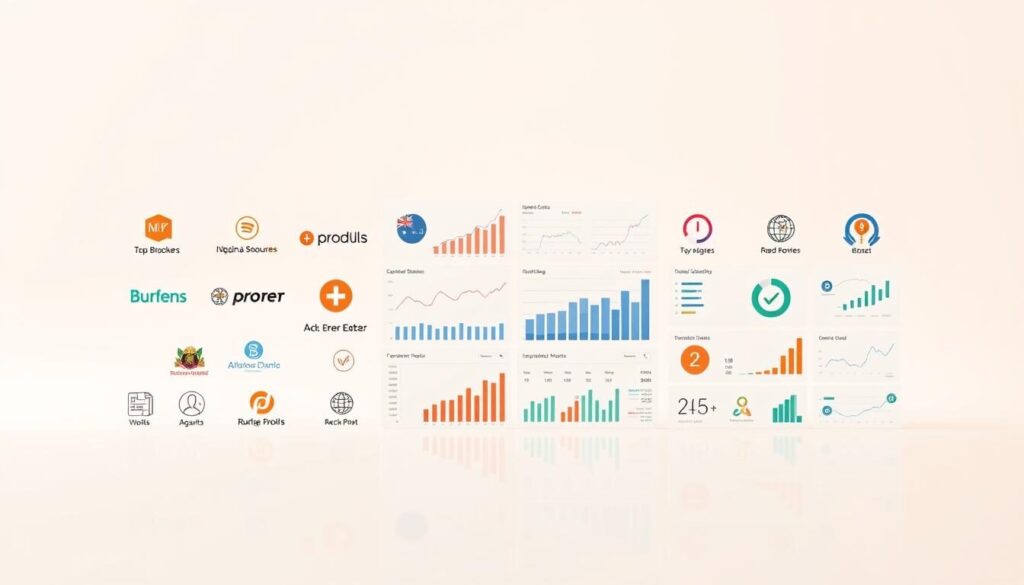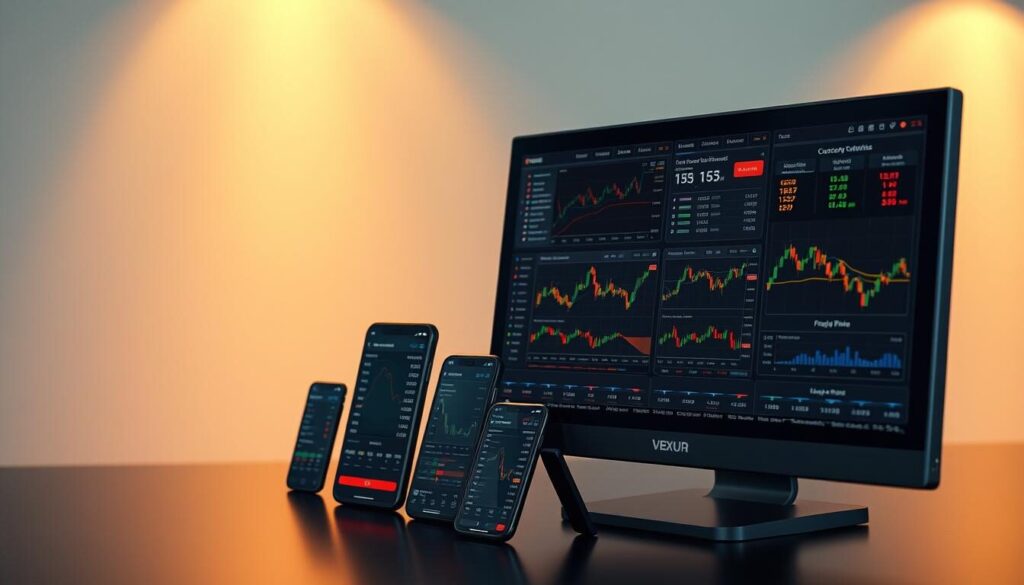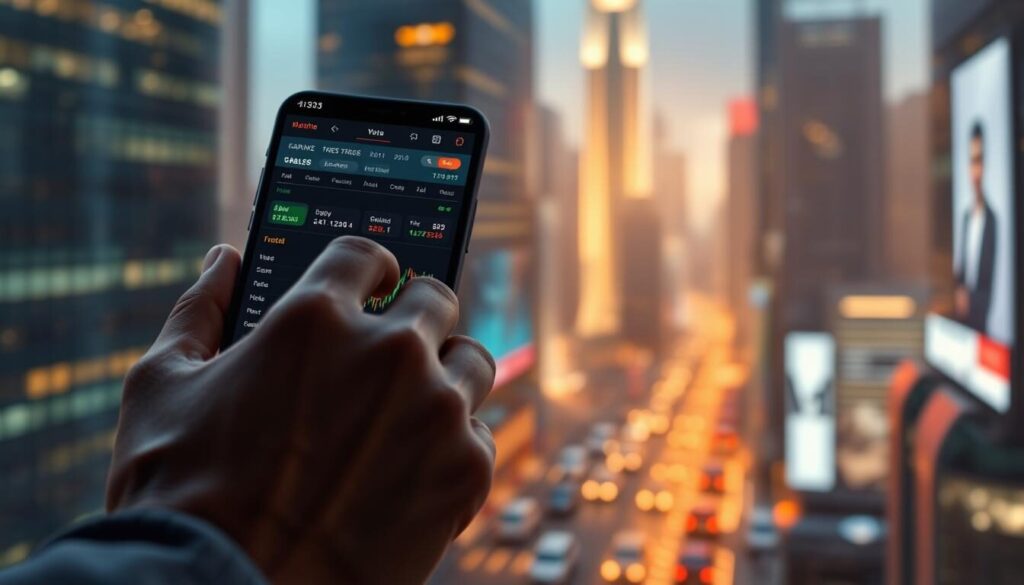Did you know Nigeria’s forex market now moves more daily volume than its entire entertainment industry? That’s right – while Afrobeats dominates playlists globally, a quiet revolution is happening in trading apps and online platforms. We’ve spent months slicing through data (and caffeine-fueled nights) to find platforms that won’t leave you feeling like you’re solving a Rubik’s Cube blindfolded.
Think of picking a trading partner like choosing gym buddies – you want reliability, not empty promises. Our team analyzed 23 services using ForexBrokers.com’s razor-sharp rating system. Why does this matter? Nigeria’s economy is growing faster than plantain sales at a Lagos roadside stand, but not all platforms keep pace.
Here’s the kicker: we found brokers offering tighter spreads than your favorite jeans, plus tools that make complex trades feel like sending a WhatsApp message. Whether you’re strategizing during your commute or managing positions between Zoom meetings, we’ve got options that adapt faster than Lagos traffic patterns.
What You Need to Know
- Nigeria’s trading scene is booming, with platforms evolving to match global standards
- Regulatory safety nets matter more than flashy promises
- Top services balance user-friendliness with advanced tools
- Our review process combines data analysis with real-world testing
- Options exist for every style – from quick trades to long-term plays
Let’s cut through the noise together. By the end of this guide, you’ll have the clarity of a Nollywood plot twist – minus the dramatic music.
Market Overview: Forex Trading in Nigeria 2025
With over 230 million people, Nigeria’s trading scene is buzzing like a Lagos marketplace at noon. The country’s economy – Africa’s largest – now sees retail traders moving over $500 million daily across currencies. Think of it as plantain frying meets Wall Street hustle.
Here’s the twist: while the Nigerian Stock Exchange (NGX) handles local equities, currency markets operate 24/5 through global platforms. Traders here get the best of both worlds – regulated local options and offshore brokers offering tighter spreads than your favorite Ankara fabric. Market volumes have grown 40% annually since 2022, outpacing neighbors like Kenya and South Africa.
Why does this matter? Morning commutes now double as trading sessions. Platforms sync with London and New York hours, letting you catch both sunrise deals and midnight oil opportunities. Legal? Absolutely. The Central Bank keeps watch, though most activity happens through international channels.
Compared to other emerging markets, Nigeria’s conditions are spicier than jollof rice. Lower entry deposits than India. Faster execution than Brazil. And leverage options that’d make a danfo driver nod in approval. Just remember – volatility here swings faster than Afrobeat rhythms.
The Regulatory Framework in Nigeria
Imagine trading regulations as Lagos traffic rules – chaotic at first glance, but surprisingly structured when you know the players. Nigeria’s financial guardians work like a tag team: the Central Bank (CBN) keeps the naira stable like a skilled DJ balancing sound levels, while the Securities and Exchange Commission (SEC) watches over market conduct like a bouncer at a nightclub.
Local Guardians: CBN and SEC
The CBN controls currency flows tighter than your auntie’s gele wrap. They set exchange rates and license dealers, ensuring financial stability. Meanwhile, the SEC focuses on investor protection – think of them as the seatbelt in your trading journey. While Nigeria lacks specific forex rules, their combined efforts create safety nets against pump-and-dump schemes.
Global Safety Nets
Here’s the catch: international oversight adds extra armor. Tier 1 regulators like the UK’s FCA and Cyprus’ CySEC demand:
- Client fund segregation (your money stays separate from broker accounts)
- Regular audits (like surprise kitchen inspections)
- Negative balance protection (no owing more than your deposit)
Why does this matter? Choosing a globally regulated platform is like having both local and international insurance. It’s not just about compliance – it’s about sleeping soundly knowing your funds aren’t playing hide-and-seek.
Advantages of Trading with Regulated Forex Brokers

Trading without regulation is like tightrope walking without a net – thrilling until gravity remembers your existence. Regulated platforms act as your financial safety harness, offering features that turn “sleep-trading nightmares” into restful nights.
Here’s the deal: regulated brokers must keep your funds in separate bank accounts – think of it like storing cash in a safety deposit box instead of under your mattress. If the broker hits turbulence, your money stays untouched. Compare that to unregulated platforms where client funds often mix with company cash faster than puff-puff disappears at a Lagos party.
Negative balance protection? That’s your “anti-debt shield.” Imagine placing a trade that goes full Wolf of Lagos – with regulation, you’ll never owe more than you deposited. Unregulated brokers? They’ll let your account plunge deeper than Nigeria’s Super Eagles in a penalty shootout.
| Feature | Regulated Brokers | Unregulated Brokers |
|---|---|---|
| Fund Security | Segregated accounts | Mixed funds |
| Transparency | Regular audits | Black box operations |
| Leverage Limits | Capped risk | Sky-high ratios |
| Dispute Help | Mediation access | Radio silence |
Newcomers gain training wheels through demo accounts and clear fee structures. Veterans get advanced tools without sacrificing security – like having both Formula 1 speed limits and airbags. ForexBrokers.com data shows 83% of traders report better sleep using regulated platforms.
Think of regulation as your market umbrella in Nigeria’s financial rainy season. It won’t stop the storm, but you’ll stay dry while others get drenched.
Best Forex Brokers in Nigeria: In-depth Comparison

Choosing trading platforms feels like smartphone shopping – endless options, but only a few won’t crash during your busiest day. We’ve pitted top services against each other using data sharper than a Lagos tailor’s scissors. Let’s decode what really matters when matching platforms to your strategy.
Specialists vs All-Rounders
XTB shines for new traders – think of it as the “MTN mobile money” of platforms. Zero minimum deposit and educational tools that explain pips better than grandma’s market haggling. Capital.com? That’s your scalper’s dream with EUR/USD spreads tighter than Lagos traffic gaps (0.67 pips).
AvaTrade caters to night owls with 24/7 support – like having a suya stand outside your door. Their $100 entry works for serious players, while FP Markets attracts pros needing 40,000+ trading instruments. It’s the difference between pepper soup and five-course meals.
Numbers Don’t Lie
| Service | Entry Cost | EUR/USD Spread | Perk |
|---|---|---|---|
| XTB | $0 | 1.00 pips | Free trading signals |
| Capital.com | $20 | 0.67 pips | AI market scanner |
| AvaTrade | $100 | 0.93 pips | Guaranteed stop-loss |
| IC Markets | $200 | 0.62 pips | Raw spreads |
Notice how minimum deposit and spreads dance together? Lower entry often means wider spreads – like choosing between instant noodles now or jollof rice later. Our advice: test demo accounts like sampling street food before committing.
Key Features to Consider When Choosing a Forex Broker

Picking a trading platform feels like choosing a smartphone – you want features that fit your lifestyle, not just shiny specs. The right setup turns complex moves into smooth swipes. Let’s break down what really matters.
Trading Platforms and Tools
Your platform is your trading cockpit. MetaTrader 4/5 remains the industry standard – think of it as the WhatsApp of currency apps. But newer players like eToro’s social trading tools act like financial TikTok, letting you mirror top traders’ moves.
Look for:
- Real-time charts sharper than Lagos pepper soup
- One-click trading faster than danfo bus conductors
- Economic calendars that track events like your favorite sports app
Proprietary platforms from brokers like AvaTrade offer guaranteed stop-losses – the trading equivalent of airbags. Technical analysis tools? They should feel like a Swiss Army knife, not plastic cutlery.
Account Types and Minimum Deposits
Accounts work like Netflix subscriptions – different tiers for different needs. Demo accounts let you practice risk-free, while cent accounts (where $1 = 100 cents) help new traders avoid big losses.
| Account Type | Best For | Minimum Deposit |
|---|---|---|
| Standard | Most traders | $50-$200 |
| ECN | Speed demons | $500+ |
| Islamic | Swap-free needs | $100 |
That $50 minimum deposit? It’s the difference between testing waters and diving headfirst. Brokers like XTB offer zero-entry accounts, while IC Markets asks for $200 – perfect for serious players. Match your budget like pairing jollof rice with the right protein.
Remember: Your account features should grow with you. It’s not about finding perfection – it’s about flexible tools that adapt faster than Lagos weather. Choose platforms that feel less like rigid systems, more like choose-your-own-adventure books.
Navigating Forex Trading Fees and Costs

Trading fees are like pepper in soup – too much ruins the flavor, but the right amount spices up profits. Let’s slice through the jargon to help you keep more naira in your pocket.
Spread: The Silent Profit Snatcher
The spread – difference between buy/sell prices – works like a danfo bus conductor’s “change.” Thinner spreads (0.6 pips on EUR/USD) mean more money stays yours. See the catch? Brokers offering $0 deposit often widen spreads – like getting free suya but paying extra for pepper.
Swap Fees: Midnight Tax
Holding positions overnight? That’s when swap fees strike – interest charges thinner than a Nollywood plot twist. These compound faster than Lagos traffic jams. Pro tip: Check brokers like Capital.com that offer swap-free accounts for Islamic traders.
| Platform | Spread (EUR/USD) | Overnight Fee* |
|---|---|---|
| XTB | 1.00 pips | $2.10 |
| Capital.com | 0.67 pips | $3.80 |
| AvaTrade | 0.93 pips | $4.20 |
*Per $10,000 position
Here’s the kicker: A 0.3 pip difference seems smaller than a kobo coin. But trade 20 lots monthly? That’s ₦58,000/year vanishing like puff-puff at a birthday party. Always compare conditions – some platforms hide fees in withdrawal charges or “inactivity taxes.”
Smart move: Demo accounts let you test fee structures risk-free. It’s like tasting market soup before buying the whole pot.
Leverage, Risk Management, and Trading Conditions

Leverage works like chili pepper – a little adds kick, too much burns your portfolio. Imagine controlling ₦5 million positions with just ₦10,000. That’s 1:500 leverage – the financial equivalent of riding a motorcycle on Lagos’ Third Mainland Bridge during rush hour.
Here’s the twist: while brokers like OctaFX offer 1:1000 ratios, platforms under strict regulators cap at 1:50. Why care? Pepperstone’s 500:1 might sound sweeter than coconut candy, but one bad trade could empty your account faster than fuel queues disappear.
Smart traders use three shields:
- Stop-loss orders (like setting a curfew for risky trades)
- 1-2% risk per trade (never bet the whole plantain harvest)
- Margin level alerts (your account’s low-fuel warning light)
Let’s break margin math. With 1:100 leverage, a $10,000 EUR/USD position needs $100 margin. If prices drop 0.5%, you lose $50 – half your stake. Brokers force-closing positions? That’s margin calls shouting “oya, pack up!”
| Platform | Max Leverage | Margin Call |
|---|---|---|
| Pepperstone | 1:500 | 50% level |
| eToro | 1:50 | 100% level |
| BlackBull | 1:500 | 80% level |
Notice how higher leverage often means stricter margin rules? It’s like danfo drivers – faster rides come with sharper brakes. Slippage during news events? That’s Lagos traffic for traders – orders execute at worse prices than expected.
Remember: 78% of accounts lose money with high leverage. Your strategy needs seatbelts – risk tools matter more than broker bonuses. Because surviving the market’s potholes beats short-term speed.
Mobile Trading: Best Apps and Features in Nigeria

Your phone now holds more trading power than Wall Street computers did in 2005 – welcome to Nigeria’s mobile revolution. Markets move faster than danfo drivers changing lanes, and traders need tools that keep pace. Let’s explore how apps transform your device into a pocket-sized trading floor.
User-Friendly Mobile Platforms
Great trading apps work like your favorite ride-hailing service – intuitive buttons, clear maps, and instant action. XTB’s xTrader 5 lets you swipe through charts like Instagram stories, while OANDA’s app serves real-time data crispier than fresh akara. Key features winning hearts:
- One-tap orders (faster than yelling “oya!” to a bus conductor)
- Customizable charts with 50+ indicators
- 24/5 support chatbots answering FAQs
AvaTrade’s app even lets you practice with virtual naira – like test-driving a Bentley before buying.
Benefits of On-the-Go Trading
Imagine catching a GBP/USD dip while queueing for fuel – that’s mobile magic. These apps turn dead time into profit windows:
- Price alerts buzz like urgent WhatsApp messages
- Live news streams during lunch breaks
- Risk management tools accessible during Lagos traffic jams
Capital.com users rave about setting stop-losses mid-commute. It’s trading freedom – no desktop chains. Just don’t get too hooked; your boss might notice those intense chart-staring sessions.
Customer Support and Educational Resources
Imagine your trading platform ghosting you during a market crash – that’s why 24/7 support isn’t just nice, it’s necessary. Reliable help desks act like financial seatbelts, keeping you secure when volatility hits Lagos-level chaos. Platforms like Wealthway FX prove this with live chat response times faster than a danfo driver’s honk.
New to trading? Educational resources matter more than your auntie’s investment advice. Top services serve knowledge buffets:
- Webinars explaining pips better than Nollywood subtitles
- Video tutorials breaking down charts like jollof rice recipes
- Market analysis sharper than a tailor’s measuring tape
Here’s the kicker: brokers like Eightcap offer research tools that scan markets like airport security – nothing gets past their Trade Zone scanners. Combine this with demo accounts, and you’ve got training wheels for navigating currency rollercoasters.
Pro tip: Test response times before depositing. Ask “How do I set stop-loss?” during your midnight snack run. If they reply before you finish that puff-puff, you’ve found a keeper. Because when spreads widen like Third Mainland Bridge traffic, you’ll want guidance that answers faster than Google Maps reroutes.
Advanced Trading Tools and Market Research
Think of market analysis tools as your smartphone’s flashlight – they reveal hidden patterns in the financial darkness. While new traders might rely on basic charts, veterans use gear that turns raw data into actionable insights faster than a Lagos tailor stitches Ankara fabric.
Your Financial Crystal Ball
Economic calendars work like weather apps for money markets. They track:
- Central bank announcements (the “rain forecasts” of finance)
- Employment reports (economic health checkups)
- GDP growth numbers (national report cards)
Brokers like XTB bake these tools directly into their platforms. Capital.com pairs calendars with Refinitiv research – imagine having CNN Business updates fused with your trading charts.
Chart Whisperers Unite
Technical analysis tools transform squiggly lines into stories. AvaTrade’s platform offers 50+ indicators – more options than a suya spice rack. Popular picks include:
- Moving averages (market mood rings)
- RSI indicators (overbought/oversold alarms)
- Fibonacci retracements (mathematical roadmaps)
Here’s the secret: these tools don’t predict the future. They’re like danfo bus mirrors – helping you spot risks before they hit. Combine them with live data feeds from brokers like FP Markets, and you’ve got Wall Street-grade intel in your palm.
Pro tip: Demo accounts let you test tools risk-free. It’s like practicing knife skills on plantains before tackling a whole goat. Because in trading, the right tools don’t just save time – they save profits.
Ensuring Secure and Protected Trading
Trading security is like wearing a helmet in Lagos traffic – it won’t prevent accidents, but keeps you intact when chaos strikes. Your money’s safety matters more than chasing flashy returns. Let’s unpack the armor every smart trader needs.
Your Financial Airbag System
Negative balance protection acts like an emergency brake. Imagine EUR/USD crashing faster than a danfo bus downhill – this feature ensures you never owe more than your account balance. Brokers like FXTM and Exness automatically reset your risk exposure to zero, turning potential debt into a clean slate.
Fund segregation works like separate bank accounts for you and the broker. Your naira stays in guarded vaults at top-tier banks – completely untouched if the platform faces trouble. It’s the difference between storing cash in a locked safe versus tossing it into a crowded market stall.
- Regulated platforms use 256-bit encryption – safer than your WhatsApp chats
- Two-factor authentication adds a second lock to your account
- Daily backups protect trade history like cloud storage for family photos
Here’s how to verify your safety net:
- Check the broker’s “About” page for segregated account details
- Look for “negative balance protection” in their risk disclosures
- Confirm regulatory codes with agencies like CySEC or FSCA
These features transform trading from a gamble into calculated strategy. Because surviving market storms requires more than luck – it demands bulletproof safeguards.
How to Verify a Broker’s Regulation and Safety
Checking a broker’s credentials is like inspecting a used car – you want proof it won’t break down mid-journey. Savvy traders adopt a “trust but verify” approach, treating regulatory checks as essential as locking their front door. Let’s turn you into a verification ninja.
Database Decoder Ring
Start with Nigeria’s SEC website – their search tool works like a Nollywood movie database, but for licensed platforms. For international brokers:
- Visit the FCA’s register (UK) or CySEC portal (Cyprus)
- Type the broker’s exact name – spelling matters like suya spice ratios
- Check license numbers against the broker’s “About Us” page
Exness and FXTM show their FCA/CySEC IDs proudly – like chefs displaying hygiene certificates. If the info doesn’t match? Red flag bigger than a Lagos traffic jam.
Safety Checklist for Smart Traders
Three quick tests separate pros from pretenders:
- Fund segregation: Look for phrases like “client money protection” – brokers like AvaTrade state this clearly
- Negative balance shield: Should be listed under account features – OctaFX and XTB have it
- Physical address: Avoid PO boxes. BlackBull Markets lists actual offices in New Zealand
| Green Flags | Red Flags |
|---|---|
| FCA/CySEC licenses | “Offshore regulated” claims |
| Transparent fee breakdown | Pressure to deposit quickly |
| 2FA security options | Generic support emails |
Pro tip: Google “[Broker Name] + scam”. Real complaints surface faster than plantain burns. Remember – regulated doesn’t mean perfect, but it’s your best armor against market wolves.
Tips for Forex Beginners in Nigeria
Starting your trading journey feels like learning to cook jollof rice – everyone has advice, but you need the right ingredients. Demo accounts and educational tools act as your kitchen timer and recipe book, helping you avoid burning your first financial stew.
Master the Art of Practice
Think of demo accounts as training wheels for market navigation. Platforms like Octa and Pepperstone offer virtual funds – play money that lets you test strategies without sweating over losses. Here’s how to make practice count:
- Treat virtual trades like real money (no YOLO moves)
- Experiment with stop-loss settings – find your risk comfort zone
- Track results weekly like monitoring a plantain farm’s growth
One trader we know spent three months perfecting a strategy on AvaTrade’s demo – now he funds his suya stand profits through EUR/NGN trades. Patience pays better than haste.
Learn While You Earn (Knowledge)
Quality education works like GPS for market storms. XM Group’s video tutorials break down charts faster than peeling an orange. Look for:
- Webinars explaining candlesticks using Lagos traffic analogies
- Cheat sheets simpler than moi-moi wrapping techniques
- Live trading sessions where experts share screen setups
Pro tip: Pair learning with doing. Watch a lesson on support/resistance levels, then test the concept in your demo account. It’s like tasting soup while following a recipe – flavors stick better.
| Demo Phase | Live Trading |
|---|---|
| Zero financial risk | Real money stakes |
| Unlimited retries | Consequences matter |
| Emotion-free practice | Psychology plays role |
Remember: Every expert trader once burned their first pot of trading soup. Your journey begins with turning knowledge into action – one simmering step at a time.
Expert Strategies for Long-Term Trading Success
Building lasting wealth in currency markets is like road-tripping across Nigeria – you need a map, snacks, and a mechanic on speed dial. While quick trades offer instant gratification, the real magic happens when you treat trading like a marathon, not a 100-meter dash. Let’s unpack how pros stay profitable while others burn out faster than generators during a power cut.
Your Financial Blueprint
Think of a trading plan as your GPS – it tells you when to accelerate, brake, or reroute. One Lagos-based trader we interviewed swears by his three-ingredient recipe:
- Risk limits tighter than traffic during Third Mainland Bridge repairs (1-2% per trade)
- Weekly performance reviews (like checking your car’s oil)
- Adaptive strategies that shift with market seasons
Warren Buffet’s rule applies here: “Never lose money.” Tools like trailing stop-losses act as airbags, while position sizing ensures you’re not betting the whole plantain harvest on one trade. Platforms like Capital.com let you automate these rules – set it and forget it, like your favorite jollof rice recipe.
Advanced traders mix technical analysis with market vibes. Imagine combining traffic app data with driver intuition – that’s how they spot opportunities. One pro shared his secret: “I track USD/NGN like it’s Burna Boy’s Instagram – sudden spikes mean something’s brewing.”
Here’s the kicker: even experts update their plans. Markets change faster than Lagos weather, so quarterly strategy tune-ups are mandatory. Demo accounts become testing labs – try new moves without risking real money.
Success isn’t about perfect predictions. It’s about sticking to your plan like suya spice ratios – adjust slightly, but never abandon the core flavor. Start small, stay curious, and remember: every master trader once burned their first pot of trading soup.
Conclusion
Navigating currency markets requires the right compass – and your choice of partner determines whether you sail smoothly or get caught in storms. Through our deep dive, we’ve seen how regulated platforms act as life jackets, while sharp tools turn complex moves into intuitive swipes.
Remember: Fees hide in spreads like pepper seeds in soup. Platforms like Exness and Octa prove low costs don’t mean sacrificing security. Whether you’re eyeing USD pairs or local trades, transparency separates contenders from pretenders.
Your journey thrives on three pillars: risk shields tighter than Lagos traffic, mobile apps faster than danfo conductors, and education that sticks like jollof rice. Revisit our broker comparisons – they’re cheat sheets for avoiding rookie burns.
Here’s the secret sauce: success isn’t about perfect predictions. It’s choosing partners who grow with you, turning market chaos into rhythmic opportunity. Now grab your demo account like a tasting spoon – the feast awaits.
